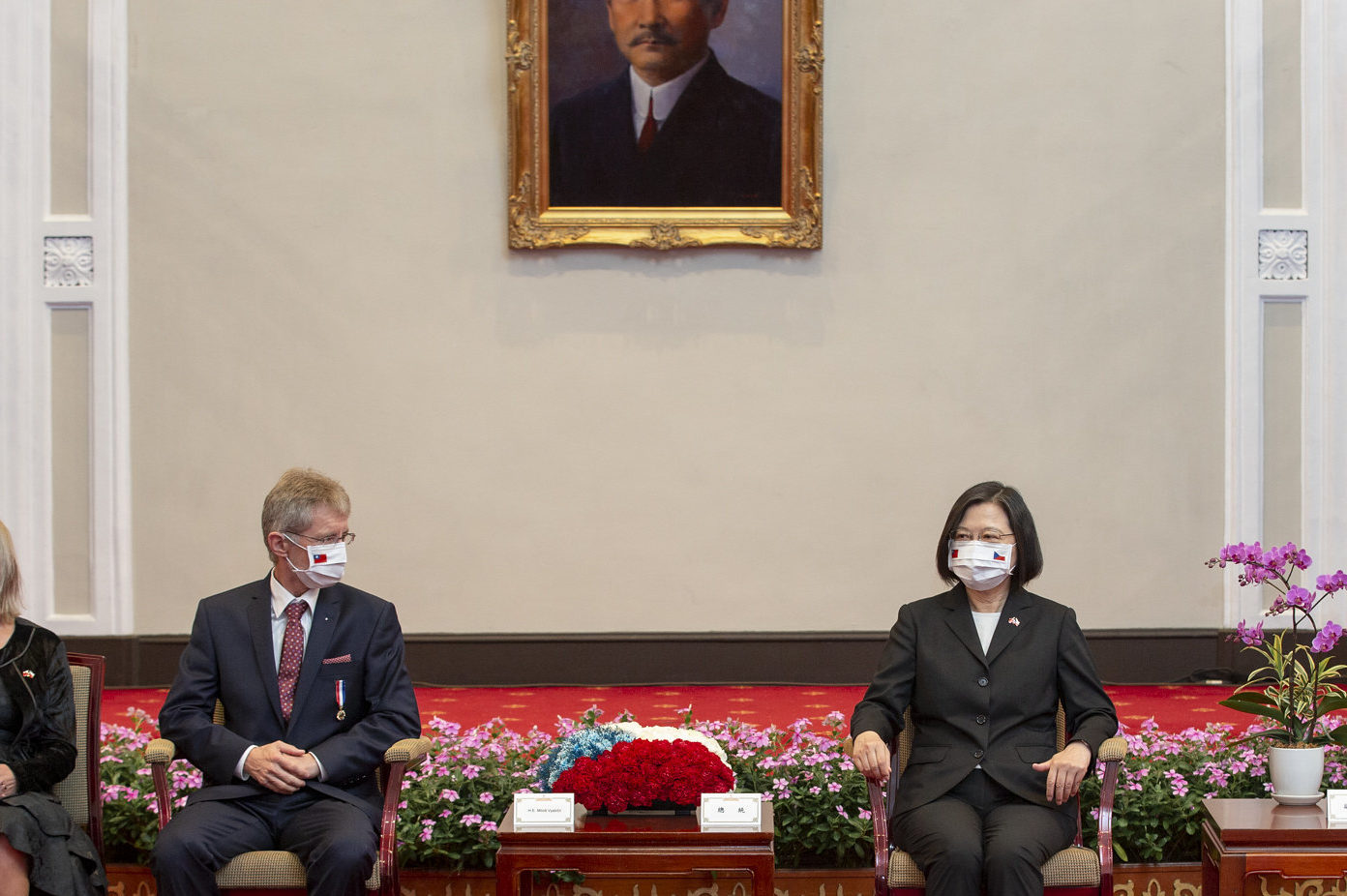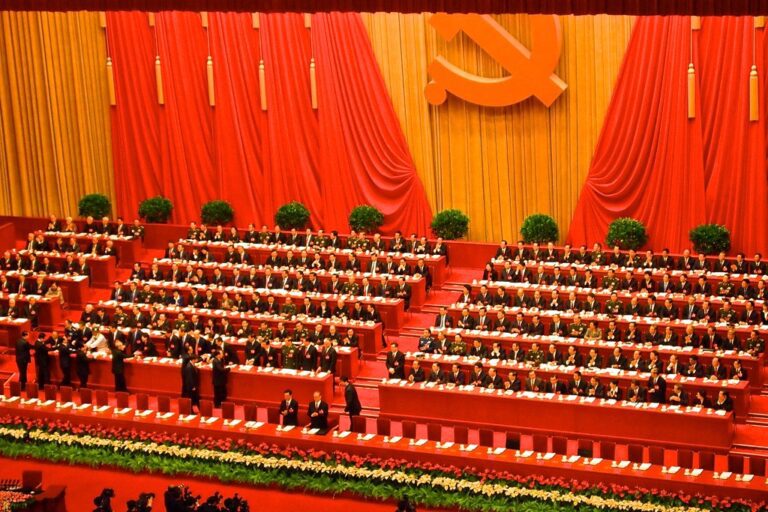Beyond COVID-19 Diplomacy: Sustaining Momentum in CEE-Taiwan Relations

As the Lithuanian Foreign Minister Gabrielius Landsbergis announced his country’s pledge to donate 20 thousand COVID-19 vaccine doses to Taiwan, the Taiwanese people were quick to devise creative ways to demonstrate their gratitude. Rapidly, generous donations poured into Lithuanian nonprofits and a ten-fold increase in orders of Rūta chocolate was observed as a form of effusive appreciation.
Vilnius’ decision to strengthen its ties with Taipei through vaccine diplomacy, a move echoed soon after by both Bratislava and Prague, is indicative of a new momentum in relations between Taiwan and Central and Eastern European (CEE) countries. It remains crucial, nevertheless, to remain vigilant about these stakeholders’ ability to maintain the newfound openness.
Further, it is imperative that Taiwan and its partners in the CEE devise ways to institutionalize their relations and minimize the potential negative effects of electoral volatility on their ties.
Vaccine Donations
The onset of the COVID-19 pandemic brought about two substantial changes to dynamics in CEE-China and CEE-Taiwan relations. At the EU level, a normative gap continues to expand and burden the strategic partnership between Europe and China. Simultaneously, at the national level, many countries of the CEE region, including in particular Czechia, Lithuania, Poland, and Slovakia, have seen an intensification in their exchanges with Taiwan, in medical cooperation and beyond.
As part of the #TaiwanCanHelp campaign, Taiwan provided more than 16 million medical masks to healthcare professionals around the world – including Poland, Slovakia, and Lithuania. Moreover, Czechia received a gift of 25 ventilators, and, following the visit of the delegation led by Senate President Miloš Vystrčil, Taiwan transferred five mask assembly lines to the country.
Cooperation went beyond just transfers of tangible goods. Shipments of personal protective equipment (PPE) have also led to the launch of first-ever direct charter flights between Poland and Taiwan. Additionally, Czechia became the first European country to announce a joint framework on epidemic prevention cooperation with Taiwan, whereas talks on coronavirus control between the Polish Academy of Sciences and Academia Sinica led to the signing of an MoU between the two entities.
When Taiwan–largely regarded as a poster child of a successful pandemic containment–found itself in the grip of its first major COVID-19 flare-up in May, CEE countries decided to return the favor. After Japan and the United States responded to Taiwan’s urgent need for vaccines –announcing donations of 3.37 and 2.5 million doses, respectively– European countries quickly followed suit.
Soon after, Lithuania announced a donation of 20 thousand doses to Taiwan on June 22. Prime Minister Ingrida Simonyte forthrightly declared, “We’d like to do more, but we do what we can.” The decision came about in the broader context of Lithuania-China schism, after the Baltic country became first to announce its departure from the 17+1 framework.
Central European countries also emulated Vilnius’ gesture of solidarity. On July 16, Slovakia pledged a transfer of 10 thousand vaccine doses. The Czech announcement followed soon after; on July 26, as Health Minister Adam Vojtěch stated Prague would send 30 thousand doses to Taiwan – a gift which Senate President Vystrčil described as “concrete help to a country that has already helped us several times.”
“These donations are not just one-off gestures,” Chiu Tai-Yuan, Member of the Legislative Yuan and President of the Taiwan Medical Association, asserted. “Rather, they reflect the efforts of our diplomats in building resilience through cooperation.”
Yet, the legislator pointed out that “When it comes to bilateral cooperation, though, we are not as close with CEE countries as we are with Germany, for example.”
CEE countries and Taiwan appear to have internalized the popular adage – “A crisis is also an opportunity for change.”
Despite the shared global challenge, they embraced new opportunities for collaboration. Nevertheless, Chiu’s comment serves as a sobering reminder that even though the recent donations are an important symbol of goodwill toward Taiwan, more efforts are required to institutionalize these special relations.
Challenging the Notion of CEE’s Homogeneity
As donors of sorely-needed COVID-19 vaccines, Czechia, Lithuania, and Slovakia garnered the attention of the Taiwanese public and media as auguries of a broader policy recalibration towards Taiwan. While CEE countries’ engagement with Taiwan shares some commonalities, it is important to give heed to idiosyncrasies in each country’s foreign policy as well as more generalizable differences between subgroups within CEE.
Two main differences between the Visegrád Group and Baltic States which affect these countries’ relations with Taipei include both the degree of institutionalization in their ties with Taiwan and the magnitude of their economic interaction.
Although all V4 countries have established representative offices in Taipei, which is reciprocated across their capitals, none of the Baltic states have a presence in Taipei. Meanwhile, Taiwan manages its affairs in the three countries through a single office in the Latvian capital of Riga. The effects of this lack of reciprocal representation is exacerbated by the low magnitude and frequency in agreement formation between the Baltic Three and Taiwan, especially when compared with V4 countries.
Similar discrepancies become evident when economic cooperation is considered. Czechia is the fourth-largest European investment destination for Taiwan and Slovakia likewise attracted major projects from Taiwanese players such as Foxconn. Czechia and Poland also hold annual trade and economic consultations with Taiwan, with all three countries concluding agreements on avoidance of double taxation as of late, a pivotal tool in attracting cross-border investment. In comparison, trade and investment cooperation with the Baltic states much more limited, both qualitatively and quantitatively.
Despite these different dynamics, Taiwan and the Baltic states can, and indeed should, continue to build upon the already established mechanisms for collaboration. One such tool is science cooperation. The formation of the Taiwan and the Baltic States Research Center on Physics in March 2020 was warmly welcomed by scholarly and diplomatic circles. This joint venture complements the trilateral Taiwan-Latvia-Lithuania scientific cooperation and mutual fund, launched in 2000.
In this context, the planned opening of a Lithuanian trade office in Taipei and a Taiwanese Representative Office in Vilnius will constitute an important step in upgrading what has been largely an ad-hoc partnership to a stronger, more institutionalized one. Yet, the prospect of establishing a “Taiwanese” representative office in Lithuania led Beijing to deploy threat signals; including a call by Chinese media for joint action by Beijing, Moscow, and Minsk to punish Vilnius.
Jerry Liu, director at the New Power Party and previously Chief of the Central Eastern European Section of Taiwan’s Foreign Ministry, said, “Let’s open our offices first before we talk about other tools [of institutionalization]. I have a gut feeling that Lithuania might have second thoughts about the Taiwanese Representative Office in Vilnius, so as not to escalate things with China.”
Liu’s comment reflects a certain degree of uncertainty about the future trajectory of Lithuania-Taiwan ties, which is reflective of the limited bilateral interactions to date. Consequently, institutionalization will remain an important variable in the future development of ties.
The Curious Case of Poland
There is also a Polish chapter in the story of European vaccine donations to Taiwan. Merely two days after the arrival of the doses from Lithuania, Taiwanese media began to speculate that Poland might also announce its own gift. Taiwan Foreign Ministry Spokesperson Joanne Ou issued a Glomar response, emphasizing that her ministry continuously sought opportunities for “vaccine cooperation with like-minded democratic partners.”
Polish media also reported on the conjecture, albeit only referencing publications from Taiwan. So far, there has been no follow-up on this possible donation. Instead, Poland is following through on its originally established plan to sell its surplus vaccines, with Australia being the first country to have sealed a purchase deal.
This is not to say, however, that Poland did not reciprocate Taiwan’s medical assistance. During the mid-May outbreak, the Polish Office in Taipei and the Polish biotechnology company Nomi Biotech Corporation donated 1,500 sets of personal protective equipment to Taipei City Government, a sister city of the Polish capital.
Such exchanges are not isolated events – Poland-Taiwan relations have been on an upwards trajectory for several years. In 2018, the Polish de facto embassy in Taipei changed its name from “Warsaw Trade Office” to “Polish Office in Taipei”, which Taiwanese stakeholders described as a “major diplomatic breakthrough”. Additionally, 2020 saw the signing of three MoUs between Polish and Taiwanese entities, covering a broad range of areas, from scientific cooperation to startup development. Most recently, the bilateral agreement on legal cooperation in criminal matters, the first of its kind between Taiwan and a European country, came into effect in February 2021.
Paradoxically, while Warsaw has seen an uptick in its relations with Taipei, it has also shown a positive reversal of its attitude toward Beijing. Interestingly, the ruling Law and Justice party does not appear to speak with a unified voice on China issues. While some party big shots lead the conversation about broadening engagement with Taiwan, others proactively engage with and openly praise the policies of the CCP.
This trajectory of dual engagement will serve as an important litmus test of European countries’ ability to balance both macro and micro-level policies. For Poland, this pertains to its capacity to concurrently expand its relations with Beijing and Taipei and whether the ruling Law and Justice party can achieve unity on its China policy.
The Path Ahead
The inclusion of CEE countries in Taiwan’s society-centric model of health cooperation has borne fruit. Nevertheless, deepening the level of institutionalization of bilateral ties as well as mutual understanding, cultivated through intellectual, cultural, and people-to-people exchanges, will continue to be a major task.
Party politics and personal factors have been an important catalyst of the newfound openness with Taiwan. With ideology rooted in anti-Communism, the center-right parties in CEE – which currently dominate the political scene in Bratislava, Prague, and Vilnius – have generally taken a more pro-Taiwan stance. While vaccine donations to Taiwan were possible under the existing party configurations, Taiwan needs to avoid overreliance on particular political actors.
“Taiwan needs to avoid becoming a bargaining chip or an electoral tool for CEE,” Ter Hsing Cheng, Executive Director of Soochow University’s Central and Eastern European Center commented.
Consequently, the importance of investing in stable development links in areas of trade, investment, education and culture should not be overlooked.
Institutionalization of relations also needs to go hand-in-hand with deepening soft power linkages and people-to-people cooperation. A broader understanding of why Taiwan matters will serve as an important tool in sustaining higher-level exchanges. Despite the upward trajectory, there are still issues with the generally low level of mutual understanding between Taiwan and CEE. Bottom-up gestures of appreciation for vaccine donations, such as face masks with cartoon personification of CEE countries or donations of cream puffs, facilitate soft power projection.
“Taiwan’s soft power is more acceptable to CEE countries and people than China’s hardcore diplomacy,” Cheng aptly remarked.
Still, having garnered significant goodwill, Taiwan must find ways to shift its successful outreach amidst the COVID-19 pandemic into something more sustainable.
Written by
Marcin Jerzewski
yehaoqinMarcin Jerzewski is the Head of Taiwan Office of the European Values Center for Security Policy. He is also a Marcin Król Fellow at Visegrad Insight. Marcin earned his Bachelor of Arts in Political Science and Chinese Studies at the University of Richmond and was an MOE Taiwan Scholar in the International Master’s Program in International Studies, National Chengchi University.

